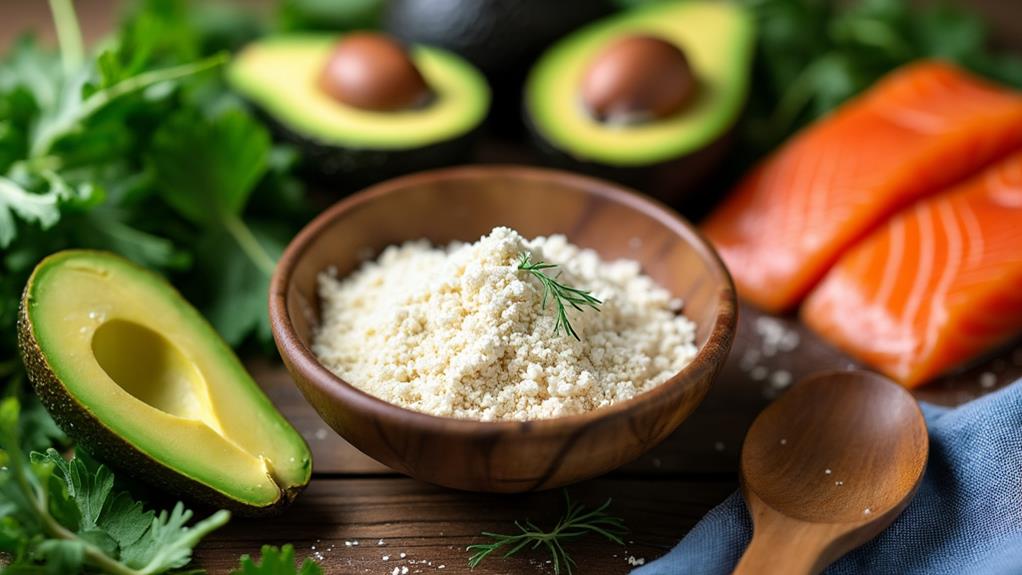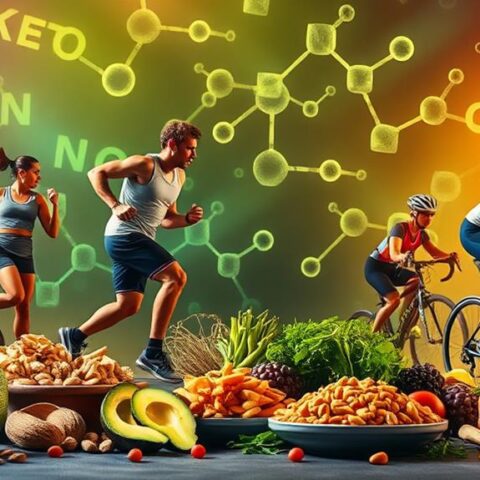
Collagen plays a pivotal role in a keto diet by offering essential amino acids fundamental for muscle maintenance and joint health, while its carb-free nature guarantees uninterrupted ketosis. This protein contributes to skin elasticity and hydration, addressing common concerns during ketosis, such as dryness. With its unique amino acid composition, collagen also supports gut health, facilitating improved nutrient absorption, which is essential for ketogenic dieters. Both bovine and marine collagen provide diverse benefits, with high bioavailability and compatibility with keto macros. The thoughtful integration of collagen can enhance the overall experience and outcomes of a keto lifestyle as further insights reveal.
Key Takeaways
- Collagen is a carb-free protein source ideal for maintaining ketosis in a keto diet.
- It supports muscle maintenance and recovery, critical for those on low-protein keto diets.
- Collagen enhances skin elasticity and hydration, addressing common keto-related skin issues.
- It aids gut health by fortifying the intestinal lining, improving nutrient absorption.
- Regular collagen intake promotes joint health and reduces pain by supporting cartilage repair.
Understanding the Keto Diet
The ketogenic diet, often referred to as the Keto diet, is fundamentally structured around a high-fat, low-carbohydrate regimen aimed at achieving ketosis—a metabolic state where the body utilizes fat, rather than glucose, as its primary energy source.
This dietary paradigm typically encompasses 70-75% fats, 20-25% proteins, and 5-10% carbohydrates. One of the prevalent keto misconceptions is that it solely promotes weight loss; however, the ketogenic benefits extend beyond just shedding pounds.
For instance, incorporating collagen supplements into a Keto diet can enhance skin elasticity and joint health due to its rich protein content. By maintaining a daily carbohydrate intake of 20-50 grams, individuals can effectively sustain ketosis, facilitating not only rapid weight loss but also enhanced energy levels and mental clarity.
It is essential to understand the balance required in this diet, particularly concerning protein intake. Adequate protein consumption is critical to prevent muscle catabolism, a common concern among Keto dieters.
This is where collagen supplements can play an important role, supplying essential amino acids that support muscle maintenance without disrupting ketosis.
The Keto diet's multifaceted benefits, coupled with the need to debunk keto misconceptions, underscore its potential as a sustainable dietary approach for those seeking improved metabolic health and cognitive function, provided it is executed with precision and scientific understanding.
What Is Collagen?
Collagen, the most abundant protein in the human body, constitutes approximately 30% of total protein content and plays a critical role in maintaining the structural integrity of connective tissues, skin, bones, and muscles.
Composed of amino acids such as glycine, proline, and hydroxyproline, collagen is integral to skin elasticity, joint health, and overall tissue repair.
With over 16 types identified, types I, II, and III are predominant, each contributing uniquely to physiological functions including skin hydration, joint flexibility, and muscle support.
Collagen Structure and Composition
Comprising approximately 30% of the body's total protein content, collagen plays a significant role in providing structural support to connective tissues, skin, bones, and cartilage.
It is synthesized through a complex process that involves the assembly of amino acids, mainly glycine, proline, and hydroxyproline, into peptide chains. These chains subsequently form a unique triple-helix structure, endowing collagen with its characteristic tensile strength and elasticity.
The dynamic balance of collagen synthesis and degradation is essential for maintaining tissue integrity and function; however, this equilibrium is disrupted with age, leading to reduced collagen levels and associated signs of aging.
Collagen is highly diverse, with at least 16 different types identified, each serving distinct biological functions. Types I, II, and III are the most common, accounting for 90% of the body's collagen:
- Type I: Mainly found in skin, tendons, and bones.
- Type II: Primarily located in cartilage, providing cushioning and flexibility.
- Type III: Present in skin and blood vessels, contributing to vascular and dermal health.
- Type IV: Found in the basement membrane, supporting cell layers in various tissues.
Understanding collagen's structure and composition is essential for appreciating its role in health and longevity.
Importance in Human Body
As the most abundant protein in the human body, collagen plays a significant role in maintaining the structural integrity of numerous tissues, including skin, bones, cartilage, and connective tissues. Comprising approximately 30% of the body's total protein content, collagen is fundamental for the structural cohesion and resilience of these tissues.
A key aspect of collagen's functionality lies in its unique amino acid composition, which is rich in proline and glycine. These amino acids are essential for collagen synthesis, which is imperative for tissue repair and muscle maintenance.
Collagen synthesis naturally diminishes with age, beginning around 25 years, resulting in the degradation of connective tissues. This decline manifests as visible signs of aging, such as wrinkles, joint discomfort, and weakened structural integrity of various tissues. Consequently, maintaining adequate levels of collagen through dietary intake or supplementation becomes vital for preserving overall health.
The body contains at least 16 different collagen types, with types I, II, and III being the most prevalent, comprising 80-90% of the body's collagen. Each type serves distinct structural functions, contributing to the resilience of skin, cartilage, and other connective tissues.
Additionally, collagen supports gut health by fortifying the intestinal lining, a benefit particularly relevant for individuals on a ketogenic diet.
Collagen's Place in Keto
Collagen is an ideal protein source for the ketogenic diet, as it offers a low-carbohydrate profile while delivering essential amino acids that support muscle maintenance and joint health.
The incorporation of collagen supplements into a keto regimen not only enhances skin hydration and elasticity but also mitigates common concerns such as workout recovery and potential hair loss associated with low-protein intake.
Moreover, collagen peptides can be seamlessly integrated into various keto-friendly recipes, providing versatility without compromising the diet's macronutrient balance.
Collagen Benefits for Keto
Incorporating collagen into a ketogenic diet offers a myriad of benefits that align seamlessly with the dietary principles of ketosis. The integration of collagen supplements can greatly improve the keto experience by enhancing collagen absorption, essential for maximizing health outcomes.
Collagen's amino acid profile, rich in proline and glycine, synergizes with keto principles, offering support for areas often compromised during ketosis. The absence of carbohydrates in collagen guarantees it maintains the metabolic state of ketosis without disrupting dietary goals, while still delivering critical health advantages.
Key benefits of collagen in a keto diet include:
- Necessary Amino Acids: Collagen provides amino acids that might be limited in a low-protein keto diet, supporting muscle maintenance and overall health.
- Skin and Joint Health: Its high proline and glycine content aids skin elasticity and joint health, addressing common concerns like dryness and joint discomfort associated with weight loss.
- Gut Health Improvement: Regular collagen intake supports gut health, important for ideal nutrient absorption and overall well-being on a restrictive diet.
- Carb-Free Protein Source: As a carb-free protein, collagen is perfect for maintaining ketosis and promoting keto synergy.
These aspects underscore collagen's valuable role in enhancing the ketogenic lifestyle.
Keto-Compatible Collagen Sources
Understanding the role of collagen within a ketogenic diet framework involves examining the specific sources that align with both dietary restrictions and health objectives. Collagen is inherently carbohydrate-free, making it compatible with keto dietary preferences, which typically restrict carbohydrate intake to 20-50 grams per day.
Among the most prevalent keto-compatible collagen sources are bovine and marine collagen. Bovine collagen is renowned for its contributions to skin elasticity and joint health, while marine collagen boasts high bioavailability and distinct skin benefits.
Hydrolyzed collagen, or collagen peptides, represents another pivotal option. Its ease of digestion and seamless integration into various keto recipes guarantee that macronutrient ratios remain unaffected.
Bone broth, rich in collagen, aligns with keto dietary preferences by providing essential nutrients and promoting gut health without compromising carbohydrate limits.
Incorporating collagen from these sources can mitigate potential side effects of ketogenic diets, such as hair loss, by supporting muscle maintenance and enhancing skin hydration. This highlights collagen's multifaceted role in addressing common concerns associated with low-protein ketogenic eating.
Integrating Collagen in Diet
Within the landscape of a ketogenic diet, integrating collagen effectively complements nutritional goals by addressing common deficiencies associated with low-carbohydrate intake.
Collagen supplements provide essential amino acids important for muscle maintenance and recovery during the weight loss process, which can be particularly beneficial given the protein limitations often encountered in a keto regimen. As a naturally carb-free protein source, collagen supports ketosis without disrupting metabolic balance, guaranteeing that daily protein needs are met efficiently.
The strategic incorporation of collagen into diet plans can be achieved through various collagen recipes, such as smoothies, coffee, soups, and baked goods. This versatility allows for seamless enhancement of nutritional value while maintaining the desired flavor profile.
- Promotes skin elasticity and hydration, mitigating dryness associated with keto diets.
- Supports joint health and reduces signs of aging, aligning with ketogenic health objectives.
- Facilitates muscle recovery and maintenance, essential during weight loss phases.
- Carb-free nature guarantees compatibility with ketogenic metabolic states.
Collagen timing is also key; regular intake can maximize its health benefits while promoting joint health and enhancing skin vitality.
Therefore, collagen emerges as an integral component, bolstering the ketogenic lifestyle's emphasis on overall well-being.
Health Benefits of Collagen
Collagen supplementation offers numerous health benefits, particularly for individuals adhering to a keto diet. One notable advantage is its positive effect on dermatological health. Enhanced collagen absorption can improve skin hydration and elasticity, reducing fine lines and wrinkles. This is especially relevant for keto dieters, who may experience dry skin due to reduced carbohydrate intake.
Collagen also plays an essential role in improving blood sugar stability, which is necessary for maintaining energy levels and preventing inflammation on a ketogenic diet. Beyond cosmetic benefits, collagen plays a significant role in musculoskeletal health. It supports joint functionality by improving cartilage integrity and reducing pain, thereby facilitating an active lifestyle integral to the keto regimen.
Amino acids such as glycine and proline, abundant in collagen, are important for maintaining muscle mass, which can be challenging in low-protein keto diets.
Collagen's impact extends to gastrointestinal health by potentially mitigating symptoms of leaky gut syndrome, thereby enhancing nutrient absorption—a key factor for keto adherence. In addition, collagen contributes to cardiovascular health by promoting the flexibility of blood vessels and reducing arterial stiffness, aligning with the broader health objectives of ketogenic diets.
Types of Collagen for Keto

Incorporating collagen into a ketogenic diet can greatly enhance nutritional outcomes, with bovine and marine collagen offering specific advantages.
Bovine collagen, mainly composed of Type I and III collagen, supports skin elasticity, joint health, and muscle mass, aligning well with the physiological demands of a keto lifestyle.
Conversely, marine collagen, primarily Type I, is noted for its high bioavailability and efficacy in promoting skin and gut health, making it a valuable addition for individuals seeking to optimize their keto diet.
Bovine Collagen Benefits
For individuals adhering to a ketogenic diet, bovine collagen emerges as a valuable supplement due to its rich composition of Type I and Type III collagen.
These types of collagen play a significant role in promoting skin hydration and elasticity, essential for maintaining youthful skin appearance amidst dietary restrictions.
In addition, bovine collagen is instrumental in enhancing joint health by supplying important amino acids that assist in cartilage repair and alleviate joint pain, which is especially beneficial for physically active individuals on a low-carb regimen.
The advantages of bovine collagen extend to muscle retention, a key consideration for those on a keto diet.
It provides a protein source that does not interfere with ketosis due to its minimal carbohydrate content, thereby supporting effective fat utilization.
Additionally, bovine collagen is known for its gut support properties, potentially mitigating symptoms of leaky gut syndrome, a common concern with restrictive diets.
Incorporating bovine collagen into a keto diet can effectively address several nutritional needs while minimizing undesirable metabolic pathways such as gluconeogenesis.
The benefits include:
- Enhanced skin hydration and elasticity
- Improved joint health and reduced pain
- Support for muscle retention without disrupting ketosis
- Promotion of gut health and alleviation of leaky gut symptoms
Marine Collagen Advantages
While bovine collagen offers numerous benefits for individuals on a ketogenic diet, marine collagen presents an alternative with its own unique advantages. As a rich source of type I collagen, marine collagen absorption is remarkably effective due to its high bioavailability, making it an ideal supplement for enhancing skin health and elasticity. The presence of essential amino acids, such as glycine and proline, further supports muscle maintenance and recovery, critical during low-carb weight loss efforts typical of a keto diet.
Marine collagen is also characterized by its lower caloric and carbohydrate content, aligning seamlessly with the macronutrient distribution favored in ketogenic regimens. Its contribution to joint health, through cartilage repair and inflammation reduction, is particularly advantageous for active individuals. Importantly, marine collagen sourcing often involves sustainably harvested fish, which not only supports environmental conservation but also offers a cleaner, eco-friendly supplement choice.
| Feature | Marine Collagen | Benefits on Keto Diet |
|---|---|---|
| Type of Collagen | Type I | Enhances skin elasticity |
| Amino Acids | Glycine, Proline | Supports muscle mass and recovery |
| Caloric/Carbohydrate | Lower | Complements keto macronutrient ratios |
| Joint Health | Cartilage repair | Reduces inflammation and alleviates pain |
| Sourcing | Sustainable Fish | Environmentally friendly and clean supplementation |
This balanced perspective underscores marine collagen as a versatile, sustainable option that supports various aspects of a ketogenic lifestyle.
Collagen's Nutritional Profile
Collagen's nutritional profile is distinguished by its amino acid composition, primarily featuring glycine, proline, and hydroxyproline, which are integral for the maintenance of skin, joint, and connective tissue health.
This amino acid profile is critical not only for structural support but also for enhancing collagen absorption, a process essential in maximizing collagen's benefits. As a virtually carbohydrate-free protein source, collagen aligns seamlessly with the ketogenic diet's macronutrient composition, which emphasizes high fat and low carbohydrate intake.
According to the Role of Protein in the Keto Diet, protein should constitute 20-30% of daily caloric intake, making collagen an excellent addition to meet these requirements without disrupting ketosis.
Collagen peptides, typically providing 10-20 grams of protein per serving, support muscle maintenance and repair, particularly crucial during the catabolic phase of weight loss on a keto diet. The unique amino acid profile of collagen contributes to this by offering necessary substrates for protein synthesis, which is essential for muscle health.
- Carbohydrate Content: Virtually carbohydrate-free, aiding in maintaining ketosis.
- Protein Contribution: Provides 10-20 grams of protein per serving.
- Muscle Support: Supports muscle repair and maintenance during weight loss.
- Nutrient Density: Enhances nutrient density in a low-carb diet.
Collagen supplementation therefore enhances overall nutrient density in a ketogenic diet, offering essential nutrients while adhering to the diet's macronutrient ratios.
Incorporating Collagen in Meals

Building on collagen's nutritional profile, the practical application of incorporating collagen into a ketogenic diet is both versatile and straightforward.
Collagen peptides can seamlessly integrate into collagen smoothies, augmenting protein intake without affecting flavor or texture. This method provides a convenient approach for those adhering to keto dietary restrictions while aiming to meet their nutritional needs.
Incorporating collagen-rich bone broth as a foundational element in soups and stews offers an effective strategy to enhance nutritional value while maintaining low carbohydrate content. This aligns well with the ketogenic principle of minimal carbohydrate consumption.
Additionally, the advent of keto-friendly products such as essential Proteins Vanilla Collagen Creamer adds a ten-gram collagen infusion and healthy fats from MCTs, suitable for creamy coffee or tea, thereby supporting keto dietary goals.
Further extending collagen's culinary utility, collagen powder can be included in keto-compliant baked goods like muffins or pancakes. This addition raises protein levels without compromising the low-carb requirement.
Gelatin desserts, such as sugar-free jellies or puddings, also present an appetizing medium to enrich collagen intake. This approach guarantees a diverse, palatable, and nutritionally optimized meal plan within the ketogenic framework.
Collagen Supplements on Keto
Integrating collagen supplements into a ketogenic diet optimizes nutritional benefits without disrupting ketosis. Collagen, a carb-free supplement, provides essential amino acids often limited in low-carb regimens.
Additionally, it can be used alongside digestive enzymes to enhance nutrient absorption and alleviate gastrointestinal issues, which are common during the shift to a keto lifestyle. The hydrolyzed form, known as collagen peptides, is particularly favored for its enhanced collagen absorption and ease of integration into various keto-friendly recipes, such as smoothies and baked goods, without impacting taste profiles.
The recommended dosage, typically between 10 to 20 grams daily, plays an important role in supporting muscle maintenance and joint health during weight loss endeavors on a keto diet. Furthermore, collagen's unique amino acid composition contributes to improved skin elasticity and hydration, addressing concerns of skin dryness that may arise during dietary changes.
Additionally, regular collagen intake aids in promoting satiety, which can effectively mitigate keto cravings, therefore supporting weight management strategies within a ketogenic framework.
- Carb-Free: Perfect for maintaining ketosis while providing necessary nutrients.
- Versatile Use: Easily incorporated into keto recipes without altering flavors.
- Skin Benefits: Enhances skin elasticity and combats dryness.
- Satiety Support: Helps reduce cravings, aiding in weight management.
Potential Side Effects

While collagen supplementation is generally regarded as safe, it is essential to recognize potential side effects that may arise when integrating it into a ketogenic diet. Digestive issues such as bloating, gas, or a sensation of fullness are reported by some individuals. Additionally, the introduction of collagen may result in altered bowel movements, including irregularity or diarrhea, warranting close attention to one's digestive health.
| Potential Side Effect | Description |
|---|---|
| Digestive Issues | Bloating, gas, or feeling of fullness |
| Allergic Reactions | Particularly with marine collagen in individuals with seafood allergies |
| Calcium Absorption | Excessive intake may interfere, impacting bone health |
| Bowel Movement Changes | Irregularity or diarrhea |
Allergic reactions, although uncommon, can occur, particularly with marine-derived collagen. Individuals with seafood allergies should exercise caution and consult a healthcare provider before commencing supplementation. Furthermore, it is significant that excessive collagen consumption could interfere with calcium absorption, which may have implications for bone health over time.
Prior to initiating collagen use, consulting with a healthcare professional is prudent to evaluate any potential interactions with medications and establish a suitable dosage. This proactive approach can mitigate risks and optimize the benefits of collagen supplementation within a ketogenic framework.
Finding Quality Collagen Products
Selecting high-quality collagen products is vital for maximizing the benefits of supplementation within a ketogenic diet. A significant factor in collagen sourcing is confirming the product is derived from grass-fed bovine or wild-caught marine sources. These sources are known for providing high-quality and bioavailable collagen, which is essential for effective absorption and utilization by the body.
Equally important is examining product labeling to verify that the collagen supplement is free from added sugars, fillers, and artificial ingredients, preserving its keto compatibility and health advantages.
Hydrolyzed collagen peptides are recommended due to their broken-down form, facilitating easier absorption and enhancing their efficacy in supporting skin, joint, and muscle health within a keto framework. In addition, third-party testing certifications on product labels are indicative of rigorous quality control and adherence to safety standards, providing assurance to consumers.
To seamlessly incorporate collagen into a ketogenic diet, consider unflavored collagen powders. They are versatile and can be added to various recipes without altering taste or disrupting ketosis.
Key considerations include:
- Collagen sourcing from grass-fed or wild-caught origins
- Product labeling for absence of sugars and fillers
- Hydrolyzed peptide form for enhanced absorption
- Third-party testing for quality assurance
Frequently Asked Questions
What Does Collagen Do for Keto?
Collagen, derived from various sources, enhances keto recipes by providing essential amino acids without disrupting ketosis. It supports muscle maintenance, joint health, and skin elasticity while potentially improving gut health, offering a balanced approach to dietary supplementation.
What Is the Role and Function of Collagen?
Collagen, integral to structural tissue support, comprises various types, with Type I found in skin and bones. Sources include animal-derived products, such as bone broth. Its functions include maintaining skin elasticity, joint health, and muscle maintenance.
Does Collagen Break a Keto Fast?
Collagen types, primarily hydrolyzed peptides, typically do not disrupt ketosis due to their carb-free nature. Fasting benefits remain intact as collagen's minimal calorie and protein content do not greatly increase insulin or blood sugar levels.
What Are the Benefits of Collagen in Your Diet?
Collagen, sourced from bovine, marine, or poultry, provides types I, II, and III collagen. These support skin elasticity, joint health, and muscle maintenance. Its amino acids enhance bodily functions, offering benefits across various dietary frameworks and health objectives.
Conclusion
Incorporating collagen into a ketogenic diet can offer numerous health benefits, including improved skin elasticity, joint health, and muscle maintenance, due to its rich amino acid profile. Various forms of collagen are available, each suitable for different dietary preferences and needs. While collagen supplements can be advantageous, potential side effects should be considered. Ensuring the selection of high-quality collagen products is imperative for maximizing benefits and minimizing risks, thereby supporting the overall effectiveness of a keto dietary regimen.










No Comments